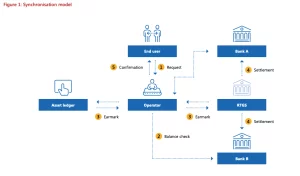The Bank of England (BoE) and the Bank of International Settlements (BIS) Innovation Hub London Center have tested an interinstitutional settlements system powered by distributed ledger technology. The Bank of England will incorporate the project’s findings into its real-time gross settlement (RTGS) system.
The BIS released a report on Initiative Meridian, a joint pilot initiative with the Bank of England, on April 19. According to the 44-page document, institutions have effectively purchased homes in Wales and England using distributed ledger technology (DLT) and the synchronization network.
According to the report, the API-based communications sent between the synchronization network and RTGS system provide a generic interface that could be “relatively easily” extended to other asset classes, such as foreign exchange. This could reduce transaction duration, costs, and hazards.

Manifestly, Project Meridian intends to develop a settlement mechanism for central bank digital currencies (CBDC). The report cites the potential benefits for central banks without equivocation:
“Synchronization can provide a catalyst for innovation in wholesale payments and support the emergence of new payments infrastructures that settle using central bank money.”
The “Political and Operational Considerations” section of the report outlines several reservations regarding the system’s potential application. Future network administrators must consider the mechanics of identity verification, for instance.
In addition, the synchronization services would be limited by existing RTGS operating hours at a time when numerous jurisdictions are contemplating extending the operating hours of national payment infrastructures.
Implementing the system would raise several legal issues, including the point of definitive irrevocability of the settlement, the digital representation of asset ownership, and the prohibition of commercial banks’ arbitrary use of clients’ funds before the transaction date.
The BIS reported in March that Project Icebreaker, which explored international retail and remittance payment use cases for CBDCs with the central banks of Israel, Norway, and Sweden, was complete.
The bank reported in October 2022 that a CBDC pilot involving the central banks of Hong Kong, Thailand, China, and the United Arab Emirates was “successful” following a month-long test that facilitated $22 million in cross-border transactions.
